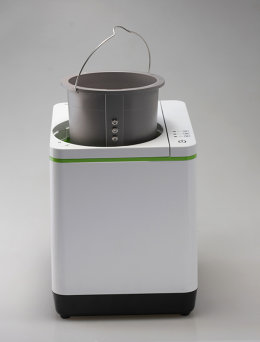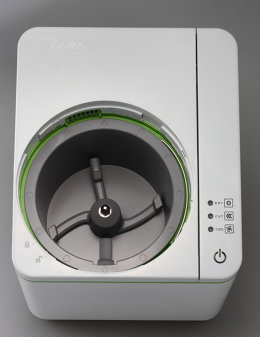Originally found here, by Adele Peters.
About 25% of the food in your refrigerator will probably end up in the trash instead of on your plate. And while that’s unfortunate for your wallet, it’s even worse for the environment: The carbon footprint from food waste is actually bigger, amazingly, than the pollution from driving the typical car. Some of the impact comes when the food goes to the landfill, since rotting scraps release the potent greenhouse gas methane.
 This is all the reason for a new kitchen device called the Food Cycler Home that aims to make it much easier for people to compost their scraps, even in cities that don’t offer composting services (which is most cities). In three hours, it can sterilize and deodorize anything and everything from orange rinds to meat and convert it to a soil amendment that can be safely sprinkled on plants.
This is all the reason for a new kitchen device called the Food Cycler Home that aims to make it much easier for people to compost their scraps, even in cities that don’t offer composting services (which is most cities). In three hours, it can sterilize and deodorize anything and everything from orange rinds to meat and convert it to a soil amendment that can be safely sprinkled on plants.
The byproduct is organic and looks like coffee grinds. “This will vary slightly depending on what you choose to process, but what is great is that anything you could eat, it could eat–including chicken and fish bones,” says Brad Crepeau from the manufacturer Food Cycle Science.
The company, which recently launched a crowdfunding campaign for the Food Cycler on Indiegogo, hopes that the product might offer a viable alternative to the need to create new municipal composting programs. “The challenge with greenbin programs is that they are often costly, and it is sometimes difficult to achieve quotas and sustain widespread buy-in, often because of the odor and unattractiveness of the greenbin and everything that lives in it,” Crepeau says.
 A larger version of the Food Cycler has been in use for three years at hospitals, restaurants, universities, and grocery stores, so the company says the technology is proven. But it’s not exactly cheap: The expected retail price is $499, while some chains might offer it for $399.
A larger version of the Food Cycler has been in use for three years at hospitals, restaurants, universities, and grocery stores, so the company says the technology is proven. But it’s not exactly cheap: The expected retail price is $499, while some chains might offer it for $399.
It also takes a fair amount of electricity as it runs–perhaps not surprising if you’re running something for three hours every day. In a month, it can use about as much as the average dishwasher. It’s not clear how that environmental impact would stack up against something like curbside composting or not composting at all, since that also takes energy, both in driving food away in trucks and running giant commercial composting facilities.
In the end, backyard composting is still probably best for anyone who has the option. Even better is trying to remember to eat the leftovers next time before they turn to mold, so we don’t have as much food waste in the first place.
—————–
I admit, this one’s a little difficult to believe. 180 degrees and three hours later, the contents are supposedly compost.
It doesn’t seem that thermophilic microorganisms can do their thing in an environment like that, and 180 degrees is a bit extreme for a composting process.
Is it aerobic or anaerobic?
I would love to try one of these out. The price is steep, just like the Naturemill.
I understand what they’re trying to achieve here, but something seems off. I’m excited to see these hit the market, and I’ll have quite a few questions for the company. I hope it’s legit.
